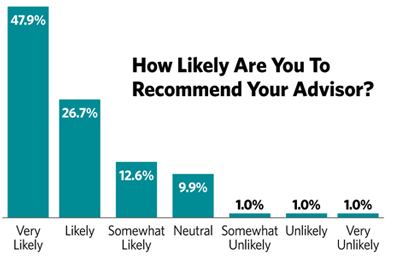Only 11.5% of new advisor searches were prompted by consumers leaving one advisor and seeking another. In fact, it is entirely possible that once clients leave their advisor they leave the world of advice altogether rather than seeking a replacement. The same phenomenon holds true for exercise gyms. When clients leave their gym, they very often do not sign up for membership at another one, instead choosing to work out on their own or just focusing on watching Bachelor in Paradise on TV (Tuesdays now).
The Examination Stage
When it comes down to choosing an advisor to work with, consumers once again trust the recommendations of the people close to them (something cited by 18.3% of those in the Ensemble Practice survey). Presentation skills also matter a lot here, with 12.0% of consumers selecting their advisor after seeing an impressive presentation. The strength of the brand is important, too, with 11.5% of consumers citing it as the primary factor driving their choice. (Notably, 49.2% of advisory clients surveyed work with a national brand firm.) Investment performance is also quite important, with 9.4% of consumers selecting their advisor primarily based on that factor.

Cost plays only a very small role as a factor in the examination process, with only 4.7% of consumers choosing their advisor primarily for that reason. Just as no one wants to go to the cheapest heart surgeon, very few consumers are looking to entrust their financial futures to the lowest bidder.
When advisors first meet with a client, that client is usually theirs to lose. Indeed, 35.6% of consumers interview only one. Another 19.9% interview two. Just over a third (35.6%) evaluate more than that during the examination stage.
When advisors realize that their competition is relatively scarce, they should change the dialogue. Rather than seeking to match terms, price and service offerings with other firms, they should above all focus on the needs of the client in front of them. Can they provide answers to the questions that keep this client awake at night? Can they connect with the client’s interests and values?
The importance to a consumer of the advisory firm’s reputation is equal to the importance they place on the advisor’s personal skills and reputation. When asked to weigh the importance of an advisor’s reputation against the reputation of the firm as a whole in the selection process, 39.8% of consumers favored the firm to some degree and 37.7% favored the advisor. Nearly a quarter of consumers (22.5%) valued them equally.
Only 13.3% of the respondents considered the brand of the firm “not important” when choosing an advisor, while 22.5% said it was “extremely important” and 26.2% said “very.” This result will suggest that the old-fashioned personal networking will be much more effective if it is complemented with impactful marketing.
The Determination Stage
Advisory firms should look at this data with optimism and a sense of opportunity. The survey data offers clarity about concepts we have intuitively known and seen in other research.
To be considered and ultimately selected by prospective consumers, advisors must begin with their existing clients—people who will be the primary source of information for others seeking out their first advisor. That said, advisors cannot and should not neglect their marketing plan. Their brand matters a lot. While it can work to do individual marketing and to cultivate the influence of friends and family, the power of a firm’s brand is undeniable, and it should be expanded and leveraged. Advisors who create a brand that resonates will improve their chances of getting through the exploration stage and being selected when the prospect is making a determination.








